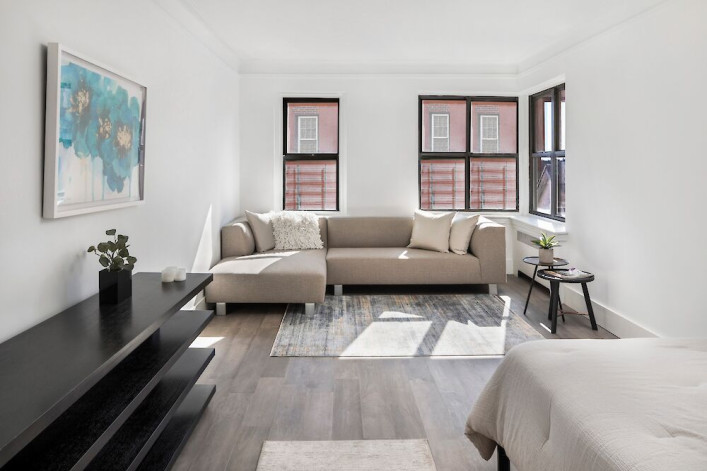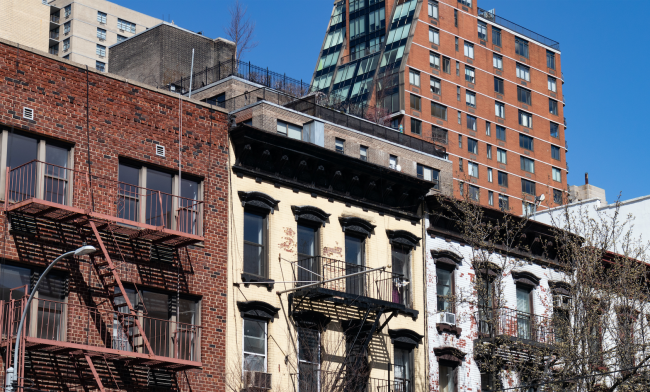Buying a NYC apartment for a retired parent? Here's what to consider

Buying a sponsor co-op, like this one at Origin North in the Bronx, allowed Luis Vargas to skip the board approval process when he bought a studio for his mother.
Although it's not as common a scenario as a parent buying for a grown child, sometimes the script gets flipped and a grown child buys a New York City apartment for their parent.
That's what Luis Vargas wanted to do for his 67-year-old mother. For the past four years, he has been searching listings for a place in her Bronx neighborhood where she could be close to her children and grandchildren. Vargas says he had the money saved and was eager to find her a place where she would be comfortable.
Many empty nesters choose to rent, but owning can provide additional stability. Still, buying on behalf of an older family member, especially one who is retired, has plenty of challenges.
Early on, Vargas had an accepted offer on a co-op his mother liked that was within walking distance of her part-time job. However, after several months, the board rejected his offer.
"It was really discouraging and really a learning experience about co-ops and their rules," he says.
Co-op boards don't have to give a reason when they reject a potential buyer and Vargas says waiting months only to be rejected left him feeling strung along. Determined to find something, he focused his search on sponsor co-ops, which are apartments being sold by the original developer or owner of the entire building. One of the big incentives for buying these types of apartments is that you can skip the board approval process.
Here are some thing to consider if you are looking to buy for an older relative or if you are a retiree.
Accessibility and amenities
Falls can be a major concern as people get older so finding an apartment without stairs is a sensible choice. Vargas' mother has knee problems so having an apartment that's accessible was important. That meant looking for an elevator building with easy access to the street. In the end, Vargas closed on a studio at one of the Origin North buildings in the Bronx, which are within walking distance of public transportation. The elevator at Origin North gives direct access to the basement and from there, there are no steps to the street.
Magdalena Ferenc, an agent with Corcoran, represented Vargas and says having a laundry room in the building is also a priority if you're buying for a parent. She points out sometimes it is difficult to find a prewar building with a washer and dryer in the apartment. "They definitely don’t want to be walking up the stairs as they get older and they want at least the basic amenities, such as on-site laundry," she says.
To tap into this market, some new developments cater specifically to seniors, like the Inspīr Carnegie Hill at 1802 Second Ave. on the Upper East Side, where all the floors are non-slip and thresholds have no height variation. There are several other high-end senior housing developments with luxury amenities in NYC, including the Watermark at Brooklyn Heights and Brookdale Battery Park City.
Co-op and condo rules
In most cases a co-op is cheaper to buy than a condo but a co-op has stricter rules on financing and occupancy. Vargas looked at both co-ops and condos for his mother but says his condo search took his mom further away from the neighborhood she liked.
If you buy a condo for a parent, the purchase should be fairly straight forward. Condos don't have the strict rules on occupancy that a co-op does.
When you're looking at co-op listings, you might see that some buildings allow pieds-à-terre, co-purchasing, or parents buying for their adult kids. Each building has a different culture and different rules but if the co-op you are interested in allows pieds-à-terre, this can be a sign there's flexibility for an adult child buying for a parent. You're unlikely to see this explicitly stated—the scenario is not as common as a parent buying for a grown child—but it's a clue about a building's rules on occupancy, something that will be spelled out in the proprietary lease.
It's a challenge finding a co-op that will allow this scenario, Ferenc says. "There are co-ops that are more lenient, that will accept gifting and co-purchasing—finding a building that will accept that is important," she says.
Sponsor co-op apartments
After that first co-op board rejection, Vargas decided to focus exclusively on sponsor apartments. The big incentive with a sponsor co-op is that you don't need board approval for your purchase.
Many of the city's prewar rental buildings were converted to co-ops roughly 50 years ago as a way of rehabilitating them and creating a new ownership structure. A sponsor co-op is a unit that's either never been sold or is owned by a company that has come in more recently and bought and renovated an entire co-op building.
Affordability and carrying costs
Whenever you're buying, your choices will be guided by your budget. Vargas bought his mother's co-op as an all-cash purchase because he had the funds and didn't want a loan hanging over him.
Ferenc says it's very important a grown child and parent have a clear understanding of how the purchase will be structured. "You need to establish what the budget will be, whether kids will be gifting the funds to assist with the purchase or they are co-purchasing with the parent," she says.
If the purchase is being made as a gift, Elise Kessler, an attorney at Braverman Greenspun, says you should consult with your financial advisor to consider any tax implications. Whether or not a gift results in additional taxes depends largely on the amount of the gift. You might also want to consider what will happen to the property when or if the parent dies.
"Do the parents have a will that will provide for the disposition of the residence upon their death? If the residence is a cooperative apartment, the transfer or assignment provisions of the co-op’s proprietary lease should be reviewed," Kessler says.
In a co-borrowing situation, the son or daughter acts as a guarantor for the purchase. Pat Lavell, vice president of mortgage lending at Guaranteed Rate, says in most cases the combined income, monthly liabilities, and housing expenses of all borrowers (adult child and parent) will be assessed. He says this allows people on fixed incomes to qualify for a mortgage through the strength of the non-occupant co-borrower.
"The caveat to this is that while a lender may approve the transaction, it’s ultimately up to the co-op as to whether a non-occupant co-borrower is allowable," Lavell says.
Another issue is establishing who will pay the carrying costs for the apartment. In a sponsor co-op purchase there's an assumption that if you can afford the apartment, you can afford the maintenance but these are details a buyer and occupier need to be clear about.
"It's very important to make sure everyone is on the same page," Ferenc says.
You Might Also Like































